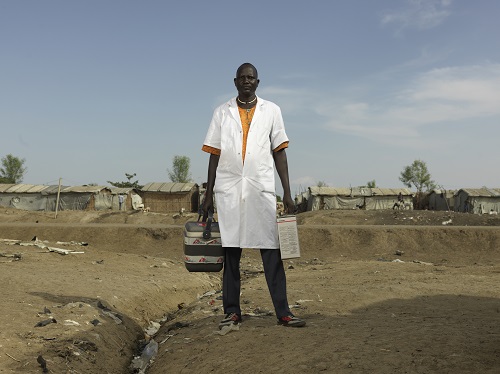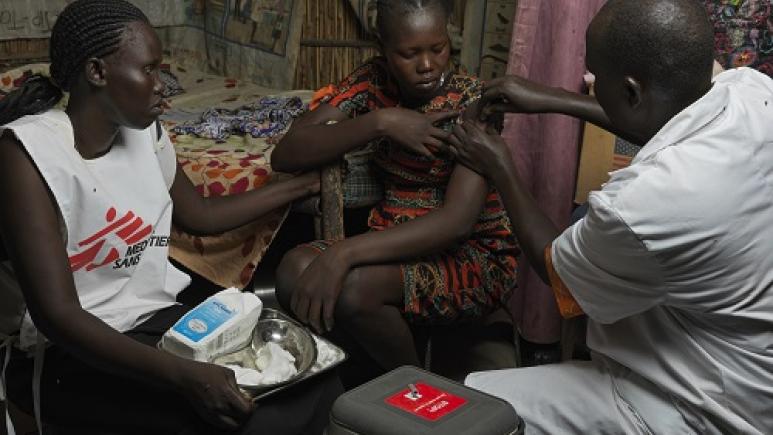Major step in the fight against hepatitis E with the world's first vaccination campaign
Hepatitis E is the most common cause of acute viral hepatitis, causing approximately 20 million infections and 44,000 deaths per year. The virus that causes hepatitis E is transmitted through faecal contamination of food and water. Large-scale outbreaks typically occur when water and sanitation are inadequate, such as in mass displacement camps.
There is no specific treatment for hepatitis E, which as a fatality rate of up to 25 percent among pregnant women. It also increases the risk of spontaneous abortions and stillbirths.
"The fight against hepatitis E has been long and frustrating," said Dr Monica Rull, Medical Director, Médecins Sans Frontières (MSF). "Over the last two decades, MSF has been responding to hepatitis E outbreaks in displacement camps, trying to control the disease in challenging conditions and seeing the devastating impact on extremely vulnerable communities. With the experience of this vaccination campaign, we hope to change the way we tackle hepatitis E in the future."
 Exposed to hepatitis E outbreaks since 2015, Bentiu camp in Unity State, South Sudan, which now has 112,000 people, saw the situation worsen in 2021 following extreme flooding and an influx of displaced people. Since July 2021, at its Bentiu hospital, MSF, which has been present in the camp since its inception in 2014, has seen 759 patients with confirmed hepatitis E, 17 of whom have died.
Exposed to hepatitis E outbreaks since 2015, Bentiu camp in Unity State, South Sudan, which now has 112,000 people, saw the situation worsen in 2021 following extreme flooding and an influx of displaced people. Since July 2021, at its Bentiu hospital, MSF, which has been present in the camp since its inception in 2014, has seen 759 patients with confirmed hepatitis E, 17 of whom have died.
The Ministry of Health of South Sudan asked MSF to help its efforts to control the outbreak, through a large-scale vaccination campaign. The only available hepatitis E vaccine, Hecolin©, has been shown in clinical trials to be highly effective at preventing disease, and the World Health Organization (WHO) has recommended that it be considered for use in outbreak responses since 2015. However, until now it has only been used on an individual basis in China, where it is licensed and used to vaccinate travellers. The vaccination campaign in Bentiu is the first time it has been used in response to a public health emergency.
Evaluate the vaccine in real-life conditions
In parallel to this mass vaccination, Epicentre is conducting a study on the coverage and acceptance of vaccination, and the effectiveness and safety of this vaccine in real conditions.
“24,469 people, representing 91% of the target, received the first dose of vaccine in March 2022, and 25,434 people or 95% of the target received the second dose in April 2022.” Says Robin Nesbitt, epidemiologist at Epicentre.
Additional data on vaccine effectiveness and safety, currently being generated through ongoing studies in Bentiu, might help allay some fears associated with the introduction of newer vaccines.
This study should also complement the relatively sparse data available to date on the efficacy of this vaccine in pregnant women, even though they suffer the most serious consequences of hepatitis E.
“Indeed Hepatitis E epidemics only occur in low-income countries in populations that are often isolated and affected by conflict," adds Etienne Gignoux, an epidemiologist at Epicentre and involved in several Hepatitis E projects. Yet research on treatments for this disease is almost non-existent. Only one vaccine is available, and it has never been evaluated under epidemic conditions until now. There is an urgent need to develop reactive and preventive vaccine strategies for those most at risk, but also better treatments and a better understanding of this disease and its impact.”
Hope of halting the spread of hepatitis
“Given the successful implementation and the community’s enthusiastic response in the first two rounds, this innovative vaccination campaign can serve as an example and be replicated in similar settings managing hepatitis E outbreaks," said Dr John Rumunu, Director General for Preventive Health Services, South Sudan Ministry of Health. "I hope the vaccine will help reduce infections and deaths from hepatitis E in Bentiu and beyond."
South Sudan’s Ministry of Health and MSF are monitoring and reporting on the results of the vaccination campaign. While other outbreak control measures are also necessary, including improving water and sanitation services, health officials believe this vaccination campaign is an important step toward reducing the burden of hepatitis E in the future. MSF hopes the campaign will encourage other countries to use the vaccine as part of measures to control outbreaks of hepatitis E.
Photo credit : Peter Caton/MSF









